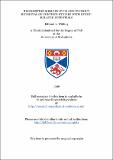Files in this item
Recognition memory with and without retrieval of context: studies with event-related potentials
Item metadata
| dc.contributor.advisor | Rugg, M. D. (Michael D.) | |
| dc.contributor.author | Wilding, Edward L. | |
| dc.coverage.spatial | 308 p. | en_US |
| dc.date.accessioned | 2018-06-28T09:00:14Z | |
| dc.date.available | 2018-06-28T09:00:14Z | |
| dc.date.issued | 1996 | |
| dc.identifier.uri | https://hdl.handle.net/10023/14684 | |
| dc.description.abstract | In six experiments event-related potentials (ERPs) were recorded while subjects performed modified recognition memory tests. All experiments consisted of an initial study phase in which subjects studied words which were presented in one of two contexts. In a subsequent test phase subjects discriminated between old and new items, and between old items which had been presented in one of the two contexts at study. The design of these experiments permitted a comparison of three critical classes of ERPs: those to words correctly judged new, and those to words correctly judged old which were either correctly or incorrectly assigned to study context. All six experiments revealed reliable differences between the ERPs to correctly identified old and new words. In experiments 3-6 the analyses of the differences between the ERPs to correctly identified old and new words revealed two topographically and temporally dissociable modulations. The first of these was maximal at parietal sites over the 500-900 msec time window, and was larger over the left hemisphere than over the right. The second modulation was more temporally extended, maximal at frontal scalp locations, and displayed a right-greater than-left hemisphere asymmetry. Both of these modulations were of greater magnitude for words which were correctly assigned to study context. These findings are consistent with the view that multiple neural systems contribute to memory for context. The experimental findings are discussed in relation to theories of the relationship between memory for prior occurrences, and memory for contextual details of those occurrences. | en_US |
| dc.language.iso | en | en_US |
| dc.publisher | University of St Andrews | |
| dc.subject.lcc | QP406.W5 | |
| dc.subject.lcsh | Memory | en |
| dc.title | Recognition memory with and without retrieval of context: studies with event-related potentials | en_US |
| dc.type | Thesis | en_US |
| dc.type.qualificationlevel | Doctoral | en_US |
| dc.type.qualificationname | PhD Doctor of Philosophy | en_US |
| dc.publisher.institution | The University of St Andrews | en_US |
This item appears in the following Collection(s)
Items in the St Andrews Research Repository are protected by copyright, with all rights reserved, unless otherwise indicated.

